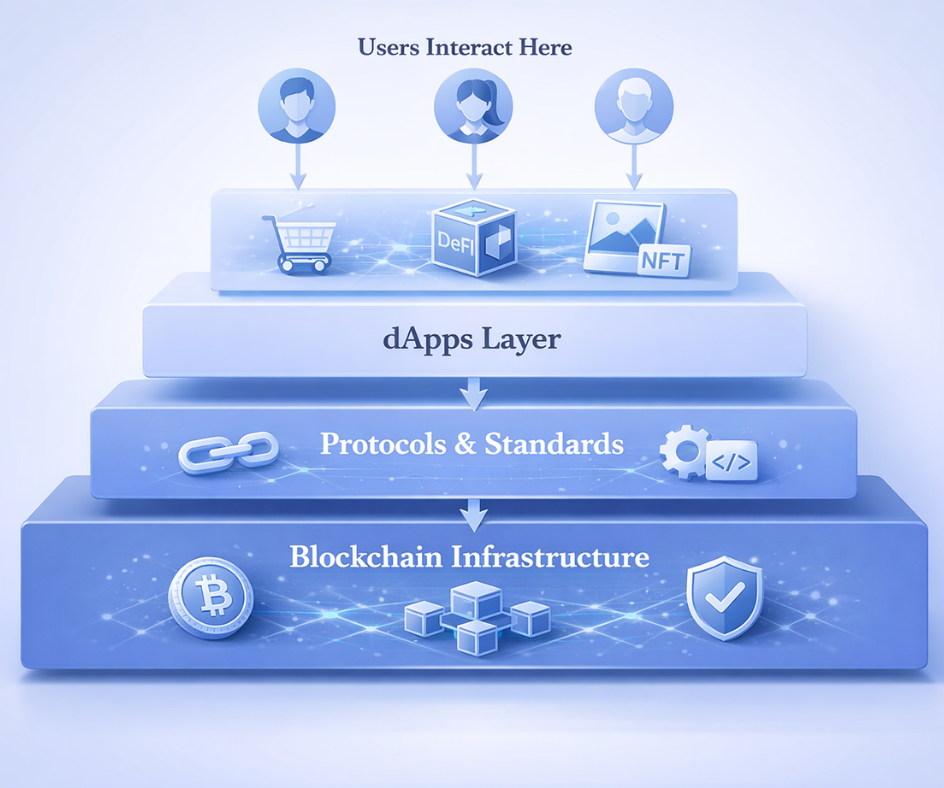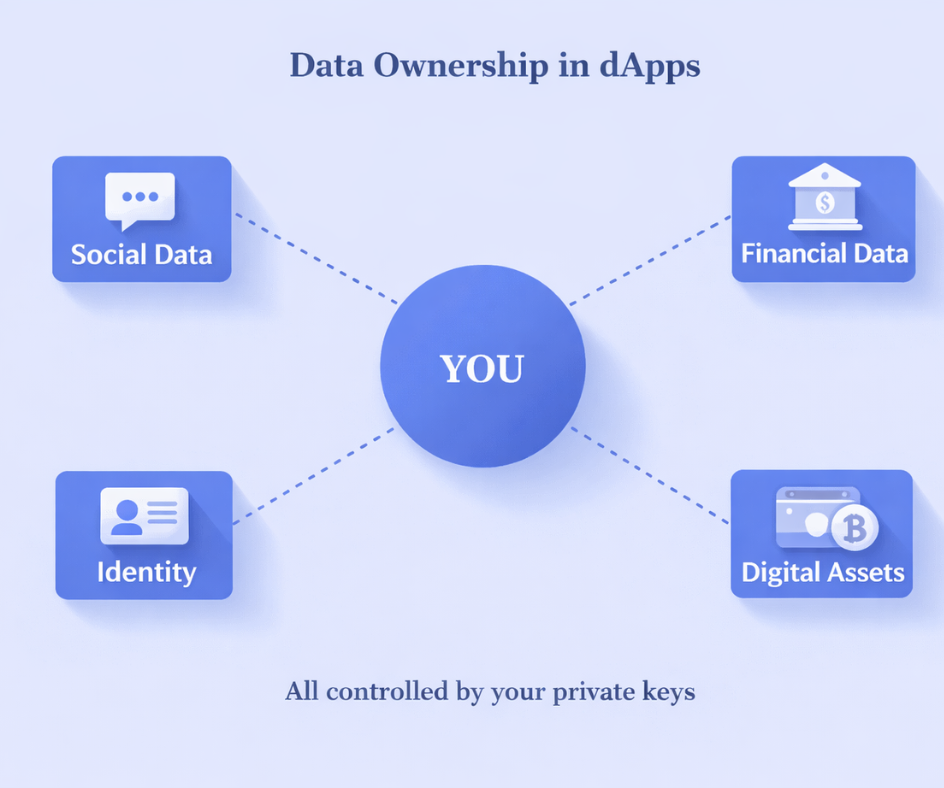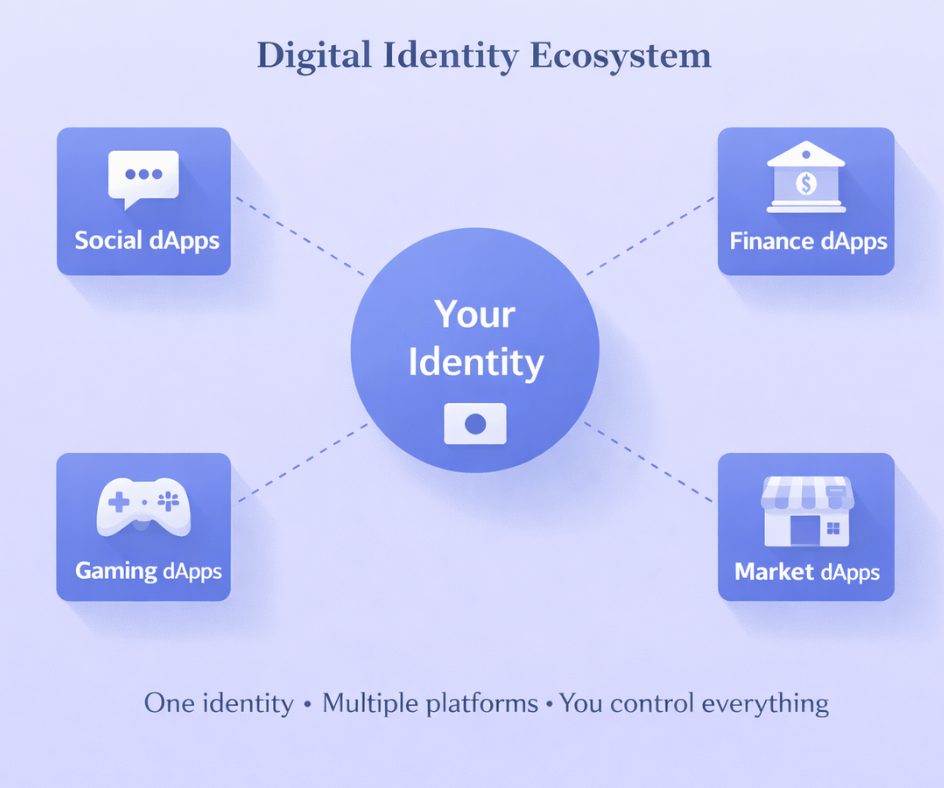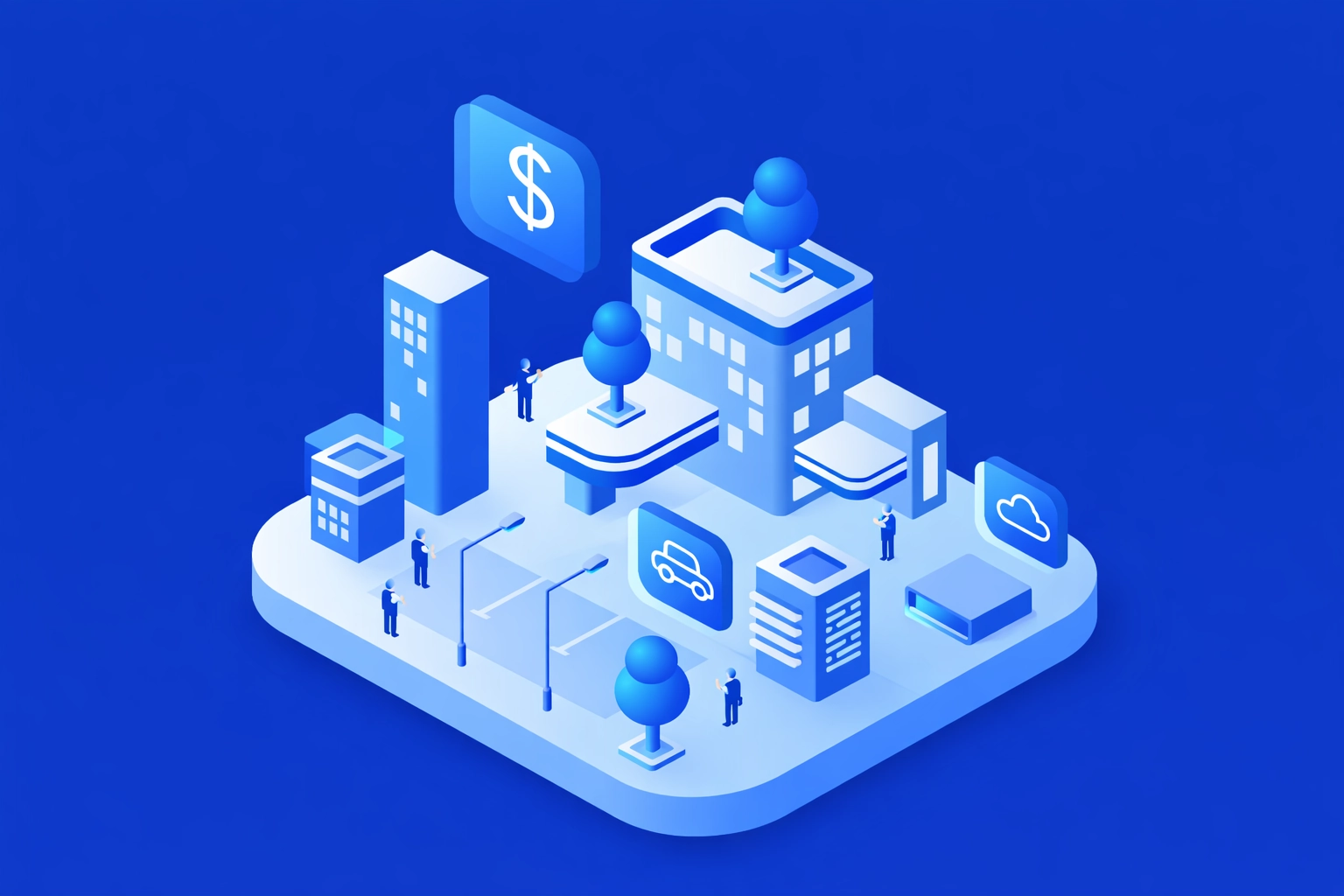Key Takeaways
- Decentralized Architecture: dApps run on blockchain networks instead of centralized servers, enabling distributed control.
- User Ownership & Trustless Interaction: Users maintain ownership of their data and interact without intermediaries, ensuring transparency.
- Smart Contract Automation: Smart contracts power dApps by executing actions securely and automatically based on predefined rules.
- Growing Use Cases: dApps are expanding across finance, gaming, identity, and social applications with increasing adoption.
- Persistent Challenges: Scalability issues, complex user journeys, and regulatory ambiguity continue to affect dApp adoption.
- Improving Ecosystem: Advancements in Layer-2 scaling, interoperability, and better wallet usability are strengthening the dApp landscape.
- Smart Adoption Approach: Users and businesses need proper education, security awareness, and clarity on trade-offs to adopt dApps effectively.
- Future of Digital Interaction: dApps are paving the way for a more open, transparent, and user-empowering version of the internet.
Introduction to Web3 and Its Core Idea
Web3 represents the third generation of internet services, fundamentally different from what we’ve known before. Unlike Web1, which gave us static web pages, and Web2, which introduced interactive social platforms and user-generated content, Web3 brings decentralization to the forefront.
According to AWS, Web3 moves away from centralized management structures and enables community-driven systems where users control data and have a greater say in project direction. The core idea behind Web3 is simple yet powerful: giving control back to users. Instead of tech giants owning your data, photos, messages, and digital identity, you own them. Instead of companies deciding what you can or cannot do on their platforms, smart contracts execute predefined rules that nobody can change arbitrarily.
This shift happens through blockchain technology, which creates a distributed ledger that no single entity controls. Every transaction, every piece of data, gets recorded across thousands of computers simultaneously. This makes censorship nearly impossible and puts power directly in the hands of communities rather than corporations.
Key Insight: Web3 isn’t just about new technology; it’s about a fundamental shift in how we think about ownership, privacy, and control in the digital world.
Understanding dApps in the Web3 Context
Decentralized applications, or dApps, are the practical expression of Web3 principles. Think of them as regular apps, similar to the ones on your phone, but without a company controlling everything behind the scenes. When you use Instagram, Facebook owns the servers, controls your data, and decides the rules. With dApps in Web3, the application runs on a blockchain network, and no single entity has ultimate control.
A dApp consists of two main parts: the frontend interface you interact with and the backend smart contracts running on blockchain networks. The frontend looks and feels like any normal application, whether it is a website or a mobile app. The actual transformation happens in the backend, where smart contracts automatically execute actions based on predefined conditions without human intervention or company oversight.
| Feature | Traditional Apps | dApps in Web3 |
|---|---|---|
| Control | Centralized company | Distributed network |
| Data Storage | Company servers | Blockchain network |
| Downtime Risk | Single point of failure | Highly resilient |
| Transparency | Closed source | Open source code |
| User Data Ownership | Company owns data | User owns data |
For example, when you use a decentralized lending platform, you are interacting with a dApp. You connect your digital wallet, deposit cryptocurrency, and the smart contract automatically calculates interest and manages loans. No bank manager reviews your application and no institution holds your funds. Everything operates through transparent, automated code.
How dApps Fit Within the Web3 Framework
The Web3 ecosystem operates like a layered cake, and dApps sit right at the top where users interact with the technology. At the foundation, you have blockchain networks like Ethereum, Solana, or Polygon providing the infrastructure. Above that, you have protocols and standards that define how things should work. Then come the dApps, the practical applications that everyday people use.
Think of dApps as bridges connecting regular users to the complex world of blockchain technology. Most people don’t need to understand how blockchain consensus mechanisms work or how cryptographic signatures validate transactions. They just want to send money, trade digital assets, or play games. dApps in Web3 provide that user-friendly interface while maintaining all the benefits of decentralization underneath.
In our consulting work over the past eight years, we have helped numerous businesses understand this positioning. dApps are not competing with Web3, they are the manifestation of Web3 principles in practical, usable form. Every successful Web3 project ultimately needs a dApp layer to deliver value to end users.

Key Principles Behind dApps in Web3
Several core principles define what makes an application truly decentralized. Understanding these principles helps distinguish genuine dApps from projects that simply use blockchain buzzwords without delivering real decentralization.
Open Source: True dApps operate with transparent, publicly auditable code. Anyone can examine how the application works, verify its security, and propose improvements. This transparency builds trust in ways closed-source applications cannot.
Decentralization: The application does not rely on a single server or company to function. Data and processing are distributed across a network of nodes. Even if hundreds of nodes go offline, the dApp continues operating.
Cryptographic Security: Transactions and data are secured with advanced cryptography. Your private keys prove ownership and authorize actions. No one can forge your signature or access your assets without your keys.
Token Economics: Many dApps in Web3 incorporate cryptocurrency tokens or digital assets. These tokens can reward users, support governance, or facilitate transactions within the ecosystem.
Consensus Mechanism: Any change to the application’s state must be validated by the network. Whether it uses proof of work, proof of stake, or another consensus method, no single party can change the system independently.
Smart Contracts and Their Role in dApps
Smart contracts form the backbone of every dApp. Imagine writing a contract on paper; it lists terms, conditions, and actions that should happen when certain conditions are met. Smart contracts do the same thing, but they execute automatically without requiring lawyers, banks, or intermediaries.
When you interact with a dApp, you are interacting with one or more smart contracts. These self-executing programs live on the blockchain and contain the business logic of the application. They handle everything from simple transfers to complex financial instruments.
| Smart Contract Function | Purpose in dApps | Real-World Example |
|---|---|---|
| Asset Management | Controls creation, transfer, and burning of tokens | NFT minting platforms |
| Access Control | Manages permissions and ownership | Token-gated communities |
| Financial Logic | Handles calculations, interest, rewards | DeFi lending protocols |
| Governance | Enables community voting and proposals | DAO platforms |
| Data Storage | Records important application state | Decentralized social networks |
Here is a practical example: In a decentralized marketplace dApp, smart contracts manage the entire transaction. When you agree to buy a digital item, the smart contract holds your payment in escrow. Once you confirm receiving the item, the contract automatically releases payment to the seller. If there is a dispute, the contract follows predefined arbitration rules. No company employee needs to manually process anything; it all happens automatically, transparently, and irreversibly.
The permanence of smart contracts creates both opportunities and challenges. Once deployed, a smart contract typically cannot be changed. This immutability prevents malicious alterations but also means any bugs in the code become permanent. That is why thorough auditing and testing are crucial before launching dApps in Web3.
How dApps Support Trustless Interactions in Web3?
The term “trustless” might sound negative, but in Web3, it’s actually a feature, not a bug. Trustless means you don’t need to trust any individual person or company for the system to work correctly. Instead, you trust mathematics, cryptography, and transparent code that anyone can verify.
Think about sending money to someone in another country. Traditionally, you trust your bank to send it, their bank to receive it, and various intermediaries in between. Each one could delay, block, or charge fees for the transaction. With dApps in Web3, you can send value directly to anyone, anywhere, knowing the blockchain will process it exactly as programmed, usually within minutes and for a fraction of the cost.
This trustless nature extends beyond financial transactions. When you participate in a decentralized voting system, you know your vote will be counted accurately because the smart contract code is public and unchangeable. When you trade digital assets, you know you’ll receive what you paid for because the exchange happens atomically in code, both sides of the trade execute simultaneously or neither does.
Our team has built numerous trustless systems over the years, and the impact is remarkable. Users who would never trust each other in person can confidently transact through dApps. People in countries with unstable banking systems can access financial services. Creators can sell directly to fans without platform approval. All of this becomes possible when you replace institutional trust with cryptographic certainty.
User Data Ownership Through dApps
In today’s internet, you generate massive amounts of data: your posts, photos, preferences, browsing history, purchases, and social connections. But who actually owns this data? In Web2, companies own it. They collect it, analyze it, profit from it, and sometimes misuse it. You are the product, not the customer.
dApps flip this model completely. When you use a decentralized social media dApp, your posts belong to you. They are stored using your cryptographic keys, and only you can authorize their use. The dApp might host the interface, but your data remains under your control. You can move it, delete it, or migrate to a different platform while keeping all your content and connections.
Consider decentralized identity systems, which are another crucial application of dApps in Web3. Instead of creating a new account for every service you use, you maintain one digital identity that you control. Each service requests only the specific information they need, and you grant temporary access. You can revoke this access anytime. Your identity is not tied to any single platform or company.
This ownership extends to digital assets as well. In traditional gaming, you might spend hundreds of hours earning in-game items, but the game company actually owns them. They can delete them, modify them, or shut down the game entirely. With blockchain-based gaming dApps, your items are truly yours. They exist as tokens in your wallet, and you can sell, trade, or transfer them whenever you want.

Security and Transparency Offered by dApps
Security in dApps operates fundamentally differently than traditional applications. When a company stores your data on their servers, you trust their security measures. If hackers breach those servers, your information gets compromised. You might not even know until weeks or months later when the company announces the breach.
dApps in Web3 distribute data across thousands of nodes. To compromise the system, attackers would need to hack the majority of these nodes at the same time, which is practically impossible for well-established networks. Your assets are protected by cryptographic keys that only you possess. Even if someone hacks the dApp’s frontend interface, they cannot access your funds without your private keys.
Transparency amplifies this security. Every transaction on a dApp gets recorded on the blockchain for anyone to verify. If something suspicious happens, such as an unauthorized transfer, unusual contract behavior, or a potential exploit, the community can identify it immediately. This transparency acts as a strong deterrent against malicious behavior.
However, transparency requires careful implementation. While transaction data is public, user identities can remain private through pseudonymous addresses. This balance between transparency and privacy represents one of the most elegant aspects of well-designed dApps.
Important Security Note: While blockchain networks are highly secure, the dApp interface and smart contracts can have vulnerabilities. Always verify you’re using the official dApp website, never share your private keys, and research projects thoroughly before investing significant funds.
How dApps Reduce Middlemen in Digital Processes
Nearly every digital interaction today involves intermediaries. Want to send money internationally? You need banks, payment processors, and clearinghouses, each taking fees and time. Want to sell digital art? You need a marketplace platform that may charge 15–30% commissions. Want to rent out property? You need booking platforms, payment processors, and trust verification services.
dApps systematically remove these middlemen. In decentralized finance platforms, you can lend money directly to borrowers through smart contracts. The contract handles collateral, interest calculations, and liquidations automatically. No bank needed. In NFT marketplaces, creators sell directly to collectors. Smart contracts manage the transaction, transfer ownership, and even distribute royalties on future sales.
This disintermediation creates dramatic cost savings. Traditional financial services often charge 3–5% for international transfers. Decentralized alternatives may charge less than 0.1%. Content creators on traditional platforms receive only 50–70% of revenue after platform cuts. On blockchain-based platforms using dApps in Web3, they can receive 90–97%.
Beyond cost savings, removing intermediaries increases speed. Traditional cross-border payments take three to five business days. dApp transfers complete in seconds or minutes. Stock trades settle in two days through traditional systems. Tokenized asset trades on dApps settle instantly.
| Process | Traditional Intermediaries | dApp Solution | Efficiency Gain |
|---|---|---|---|
| Money Transfer | Banks, SWIFT, clearinghouses | Direct peer-to-peer | 99% faster, 90% cheaper |
| Art Sales | Galleries, auction houses | NFT marketplaces | 70% more revenue to artists |
| Lending | Banks, credit bureaus | DeFi protocols | Instant approval, lower rates |
| Insurance | Insurance companies, adjusters | Parametric insurance dApps | Automatic payouts, no claims process |
| Content Distribution | Streaming platforms, publishers | Decentralized storage and streaming | 95% revenue to creators |
Economic Models Commonly Used in dApps
Traditional applications make money through advertising, subscriptions, or transaction fees paid to a central company. Decentralized applications pioneered entirely new economic models that distribute value to participants rather than extracting it to shareholders.
Token-based economies are the most common model in dApps. Users earn tokens by contributing to the network, whether through providing liquidity, creating content, or validating transactions. These tokens can be traded, used within the application, or grant voting rights on future development. This creates a circular economy where everyone benefits from the platform’s growth.
Play-to-earn gaming exemplifies this new model. Instead of paying to play games that extract value from your time and money, you earn tokens by playing. Your in-game items are NFTs you can sell to other players. Your skills and time investment generate real economic value that you capture, not the game publisher.
From our work implementing tokenomics for various projects, we’ve learned that successful economic models balance several factors. They must reward early adopters without punishing late arrivals. They need mechanisms to prevent inflation while ensuring sufficient token supply. Most importantly, they should align incentives so that acting in your own interest also benefits the entire network.
Common Economic Models in dApps
Governance Tokens
Holders vote on protocol changes and development decisions
Utility Tokens
Required to access specific features or services within the dApp
Staking Rewards
Earn passive income by locking tokens to support network security
Revenue Sharing
Token holders receive portion of protocol fees and revenue
dApps and Digital Identity in Web3
Digital identity represents one of the most transformative applications of dApps in Web3. Today, you create separate accounts for every service such as Facebook, Gmail, Netflix, and banking apps, each requiring different passwords, personal information, and verification steps. Companies own these identities. If they ban your account, you lose access to years of data and connections.
Decentralized identity dApps flip this model. You create one self-sovereign identity that you control completely. This identity consists of a blockchain address and associated credentials verified by trusted parties. When you want to use a new service, you connect your existing identity instead of creating a new account.
These identity systems enable selective disclosure, meaning you share only the necessary information. A bar checking your age does not need your name, address, or birthdate. A decentralized identity dApp can simply confirm that you are over 21 without revealing any other details. An employer verification service can confirm that you worked at a company without disclosing your salary or exact dates.
Reputation also becomes portable. In traditional systems, your Amazon seller rating does not transfer to eBay. Your Uber driver score does not apply on Lyft. With blockchain-based identity, your reputation follows you across platforms, allowing you to build trust once and use it everywhere.

Types of dApps Seen Across Web3
The dApp ecosystem has grown remarkably diverse. What started as simple cryptocurrency wallets has evolved into sophisticated applications spanning every industry. Understanding the different categories helps recognize the full scope of what dApps in Web3 can accomplish.
Decentralized Finance (DeFi): These dApps recreate traditional financial services without banks. You can lend, borrow, trade, earn interest, and access complex financial instruments. Platforms like Uniswap enable token swapping, while Aave facilitates lending and borrowing. DeFi represents the largest and most mature dApp category by total value.
NFT Marketplaces: These platforms enable creation, buying, and selling of unique digital assets. Artists sell digital art, musicians distribute limited edition albums, and brands create collectibles. Smart contracts handle everything from initial sales to ongoing royalty distributions.
Gaming and Metaverse: Blockchain gaming dApps let players truly own in-game assets. Items exist as NFTs that players can trade freely. Some games even enable player-owned economies where users earn real value through gameplay. Virtual world platforms create persistent digital environments where users buy land, build structures, and socialize.
Social Media: Decentralized social platforms give users control over their content and connections. Unlike traditional social media where platforms own everything, these dApps let users export their data, control their feeds, and even monetize content directly without platform intermediaries.
Decentralized Autonomous Organizations (DAOs): These governance dApps enable communities to coordinate and make decisions collectively. DAOs manage everything from investment funds to open-source projects, with all decisions made through token-based voting.
Supply Chain and Logistics: These dApps track products from manufacturer to consumer, ensuring authenticity and preventing counterfeits. Luxury goods, pharmaceuticals, and food products benefit from immutable tracking.
Prediction Markets: Users bet on real-world outcomes using cryptocurrency. These dApps aggregate collective intelligence to forecast events, often more accurately than traditional polling.
User Experience Considerations in dApps
User experience remains one of the biggest challenges for dApps in Web3. While the technology offers revolutionary capabilities, using decentralized applications can feel confusing and intimidating for newcomers. Bridging this gap between power and simplicity is crucial for mainstream adoption.
Setting up a wallet, understanding gas fees, managing private keys, and navigating blockchain confirmations creates friction that traditional apps don’t have. When you download Instagram, you enter an email and start posting immediately. With dApps, you first need to install a wallet extension, secure your seed phrase, acquire cryptocurrency for transactions, and understand transaction costs. This onboarding complexity turns away many potential users.
Our team has spent countless hours improving dApp user experiences. We’ve learned that abstraction is key. Users shouldn’t need to understand blockchain mechanics to benefit from blockchain technology, just as you don’t need to understand TCP/IP protocols to browse the web. The best dApps hide complexity behind intuitive interfaces that feel familiar while delivering decentralized benefits.
Recent innovations are addressing these challenges. Account abstraction lets users interact with dApps using social logins or email instead of managing private keys directly. Gasless transactions allow sponsors to cover user fees. Cross-chain bridges enable smooth movement between different blockchains. Layer two solutions provide faster, cheaper transactions that feel instant like Web2 applications.
The user experience will continue improving as the ecosystem matures. We’re moving toward a future where using dApps feels as simple as regular apps, but with all the benefits of decentralization, ownership, and control. The technology becomes invisible, and the advantages become obvious.
Design Philosophy We Follow
Progressive decentralization in UX: Start users with familiar patterns and gradually introduce Web3 concepts as they gain comfort. Never force users to understand blockchain mechanics to accomplish basic tasks. Make the technology invisible while keeping the benefits obvious.
Common Challenges Faced by dApps in Web3
Despite their promise, dApps face significant hurdles that developers and users must navigate. Understanding these challenges helps set realistic expectations and identify areas needing innovation.
Scalability Limitations: Most blockchain networks process far fewer transactions per second than traditional systems. Ethereum handles roughly 15-30 transactions per second, while Visa processes thousands. During peak usage, networks become congested, causing delays and skyrocketing fees. Layer-2 solutions and newer blockchains address this, but scalability remains an ongoing challenge.
Regulatory Uncertainty: Governments worldwide are still determining how to regulate dApps and cryptocurrency. This uncertainty creates risks for developers and users. What’s legal today might face restrictions tomorrow. Different jurisdictions have conflicting approaches, making global dApp development complex.
Smart Contract Vulnerabilities: Code bugs in smart contracts can have devastating consequences. Once deployed, contracts cannot be easily fixed. Hackers have exploited vulnerabilities to steal hundreds of millions of dollars from dApps. Rigorous auditing helps, but perfect security remains elusive.
Fragmentation: Dozens of blockchain networks exist, each with different standards, tools, and capabilities. Building a dApp that works across multiple chains requires significant additional development. Users need different wallets and tokens for different networks, creating friction.
Environmental Concerns: Some blockchain networks consume substantial energy, particularly those using proof-of-work consensus. While many networks have transitioned to more efficient mechanisms, environmental impact remains a concern for widespread adoption.
Key Management: Users are solely responsible for securing their private keys. No password reset, no customer service to help if you lose access. This responsibility, while empowering, also creates anxiety and risk of permanent loss.
| Challenge | Current Impact | Emerging Solutions |
|---|---|---|
| Scalability | High fees during peak times, slow transactions | Layer-2 rollups, sharding, new consensus mechanisms |
| User Experience | Steep learning curve, technical complexity | Account abstraction, social recovery, better interfaces |
| Interoperability | Isolated blockchain ecosystems | Cross-chain bridges, universal standards |
| Security | Smart contract exploits, hacks | Formal verification, bug bounties, insurance protocols |
| Regulation | Legal uncertainty, compliance challenges | Industry standards, regulatory sandboxes, compliance tools |
The Future Outlook for dApps in Web3
The trajectory of dApps in Web3 points toward increasingly sophisticated applications that blend seamlessly into everyday life. We’re moving beyond speculation and experimentation toward practical utility that solves real problems for real people.
Several trends will shape the coming years. Account abstraction will eliminate the need for users to manage private keys directly, making dApps as easy to use as traditional apps while maintaining security. Cross-chain protocols will enable seamless interaction across different blockchains, much like how you can email between Gmail and Outlook today. Improved scaling solutions will handle millions of transactions per second at negligible cost.
Integration with existing systems will accelerate. Rather than replacing traditional applications entirely, dApps will augment them. Your bank might offer blockchain-based international transfers alongside traditional wire services. Social media platforms might implement decentralized storage options. Gaming companies will incorporate NFT items that work across multiple titles.
Regulatory clarity will emerge as governments establish frameworks for digital assets and decentralized technologies. This clarity will paradoxically accelerate adoption as institutions gain confidence entering the space. Major corporations and governments will launch their own dApps, bringing blockchain technology to hundreds of millions of new users.
The killer applications haven’t emerged yet. Just as nobody predicted Instagram or Uber when the internet first appeared, the most impactful dApps likely haven’t been imagined. We’re still in the infrastructure-building phase. Once the foundation solidifies, creative developers will build experiences we can’t yet envision.
Artificial intelligence and dApps will converge powerfully. Decentralized AI training, transparent algorithms, and democratized access to AI capabilities will emerge through Web3 infrastructure. Imagine AI models owned collectively by users rather than corporations, with transparent decision-making processes recorded on blockchain.
From our vantage point working with cutting-edge projects daily, we see the momentum building. Every quarter brings breakthroughs that seemed impossible the year before. Transaction costs that were prohibitive are now negligible. User experiences that were clunky are now smooth. Applications that were theoretical are now operational with millions of users.
The Path Forward: dApp Lifecycle Evolution
Phase 1: Innovation (Current)
Developers experiment with core primitives. Early adopters tolerate rough edges for novel capabilities. Focus on proving concepts and building infrastructure.
Phase 2: Optimization (Emerging)
User experience improvements, scaling solutions deployment, regulatory frameworks development. Bridge between crypto-native users and mainstream adoption.
Phase 3: Integration (Near Future)
Traditional companies adopt blockchain features. Hybrid models combining centralized convenience with decentralized security. Mass market penetration begins.
Phase 4: Ubiquity (Future Vision)
Blockchain becomes invisible infrastructure. Users benefit without knowing or caring about underlying technology. dApps simply become “apps” as the distinction fades.
Thinking About Building a dApp?
The decentralized ecosystem is growing fast, and dApps are at the center of it. Whether you’re validating a concept or preparing for development, understanding dApps today puts you ahead of tomorrow’s digital shift.
Real-World Impact: dApps Transforming Industries
To truly understand the role of dApps in Web3, examining concrete examples reveals their transformative potential across different sectors.
In cross-border payouts, traditional services charge 5-7% to send money across borders, with transfers taking days. Decentralized payment dApps enable instant transfers for under 1% fees. For migrant workers sending money home to families, this difference represents hundreds of dollars saved annually, money that stays in their pockets rather than enriching intermediaries.
Content creators face similar exploitation in traditional systems. Musicians receive fractions of pennies per stream while platforms capture the majority of revenue. NFT-based music dApps allow artists to sell directly to fans, retain 85-95% of revenue, and even earn royalties automatically on secondary sales. Several independent artists now earn sustainable incomes without record label deals.
Supply chain transparency through dApps has helped luxury brands combat counterfeiting. Each product gets tokenized at manufacture, with ownership transfers recorded immutably. Buyers can verify authenticity instantly by scanning items, accessing complete provenance history. This protection extends beyond luxury goods to pharmaceuticals, preventing dangerous counterfeit medications from entering supply chains.
In developing regions with unstable currencies or limited banking infrastructure, dApps provide access to global financial systems. Anyone with a smartphone can access lending, savings accounts earning interest, and stable digital currencies, services traditionally requiring significant documentation, credit history, and minimum balances.
| Industry | Traditional Challenge | dApp Solution | Measurable Impact |
|---|---|---|---|
| Healthcare | Fragmented medical records | Patient-owned health data | Reduced redundant tests, better care continuity |
| Real Estate | High transaction costs, slow transfers | Tokenized property ownership | Fractional ownership, instant settlements |
| Education | Credential fraud, verification delays | Blockchain-verified certificates | Instant verification, lifelong credential portability |
| Charity | Donation misuse, lack of transparency | Transparent fund tracking | Donors see exact fund usage, increased trust |
| Voting | Fraud concerns, low accessibility | Secure digital voting systems | Verifiable results, increased participation |
Final Words
The role of dApps in Web3 extends far beyond technical innovation. It represents a fundamental reimagining of digital interaction. By removing unnecessary intermediaries, returning data ownership to users, and creating transparent systems operating without centralized control, dApps challenge assumptions about how online services must function.
We’re still in the early chapters of this story. Current dApps in Web3 resemble early websites from the 1990s, sometimes clunky, occasionally confusing, but undeniably pointing toward something transformative. Just as those primitive websites evolved into the rich digital experiences we enjoy today, current dApps will mature into seamless, powerful tools that billions of people use without thinking about the underlying blockchain technology.
The challenges are real. Scalability limits, user experience friction, regulatory uncertainty, and security risks continue to exist, but so does the progress. Every month brings solutions to yesterday’s problems. Every year sees adoption grow and applications improve. The trajectory is clear, even if the timeline remains uncertain.
For those willing to learn, experiment, and engage thoughtfully, dApps offer unprecedented opportunities. Whether you’re a developer building new applications, an entrepreneur exploring business models, an investor seeking exposure to emerging technologies, or simply a user tired of centralized platforms controlling your digital life, Web3 and its decentralized applications provide compelling alternatives.
The internet evolved from a research network to a global communication platform to a commercial ecosystem. Now it’s evolving again into a decentralized, user-owned infrastructure. dApps in Web3 are the vehicles driving this transformation, and we’re privileged to be part of building this future.
Frequently Asked Questions
Decentralized applications, or dApps, are software programs that run on blockchain networks instead of centralized servers. They use smart contracts to automate processes, ensuring transparency, security, and user control. Because no single authority governs them, dApps reduce censorship, prevent data manipulation, and empower users with full ownership of their digital assets and interactions.
Web3 dApps run on decentralized blockchain networks, offering transparency, security, and user ownership; unlike traditional apps that rely on centralized servers. They use smart contracts for automation, reducing reliance on intermediaries. As a result, Web3 dApps provide trustless interactions, improved data privacy, and more control over digital assets, making them essential to the Web3 ecosystem.
Smart contracts are the core of dApps. They are self-executing programs written on the blockchain that run automatically when conditions are met. These contracts eliminate the need for intermediaries, reduce human error, and ensure trustless transactions. Their transparency and immutability make dApps secure, reliable, and capable of handling complex operations within the Web3 environment.
dApps make Web3 user-centric by providing ownership and control over data and digital assets. They eliminate centralized control, reduce censorship, and increase transparency. dApps also introduce new economic models like token incentives, DeFi services, and decentralized social networks; empowering users while delivering a more secure and open internet experience.
dApps rely on blockchain’s distributed ledger, where data is recorded across multiple nodes. This structure prevents tampering, fraud, and unauthorized changes. Smart contracts automate rules without intermediaries, ensuring trustless operations. Consensus mechanisms like Proof of Work or Proof of Stake validate transactions, making dApps secure, transparent, and resistant to single-point failures.
Popular platforms for dApp development include Ethereum, Binance Smart Chain, Solana, and Polygon. These blockchains offer smart contract capability, strong security, large communities, and scalability options. Developers choose a platform based on transaction speed, fees, programming languages, and project requirements to ensure the best performance for their Web3 applications.
dApps shift control from centralized authorities to users by enabling direct interactions with smart contracts. Users retain ownership of their data, assets, and identity. Through token-based ecosystems, they can participate in staking, governance, yield farming, and community-driven decisions. This decentralized structure enhances freedom, transparency, and financial inclusion for Web3 users.
Developing a Web3 dApp involves defining the concept, selecting a blockchain platform, and writing secure smart contracts using languages like Solidity. After rigorous testing, the contracts are deployed to the blockchain. The final step includes launching the application and maintaining it through updates and improvements. Partnering with a dApp development company ensures efficient execution.
Businesses choose Web3 dApps to improve transparency, security, and user trust. dApps eliminate intermediaries, reducing operational costs while offering decentralized features like tokenization, automated processes, and global accessibility. They also enable innovative business models and long-term user engagement. As Web3 grows, adopting dApps helps companies stay competitive and future-ready.
When selecting a Web3 dApp development company, focus on their blockchain expertise, experience with platforms like Ethereum or Binance Smart Chain, and ability to build secure smart contracts. Check their portfolio, technology stack, testing process, and post-launch support. A reliable company should provide scalable solutions, follow best practices, and ensure smooth deployment.
Reviewed & Edited By

Aman Vaths
Founder of Nadcab Labs
Aman Vaths is the Founder & CTO of Nadcab Labs, a global digital engineering company delivering enterprise-grade solutions across AI, Web3, Blockchain, Big Data, Cloud, Cybersecurity, and Modern Application Development. With deep technical leadership and product innovation experience, Aman has positioned Nadcab Labs as one of the most advanced engineering companies driving the next era of intelligent, secure, and scalable software systems. Under his leadership, Nadcab Labs has built 2,000+ global projects across sectors including fintech, banking, healthcare, real estate, logistics, gaming, manufacturing, and next-generation DePIN networks. Aman’s strength lies in architecting high-performance systems, end-to-end platform engineering, and designing enterprise solutions that operate at global scale.







